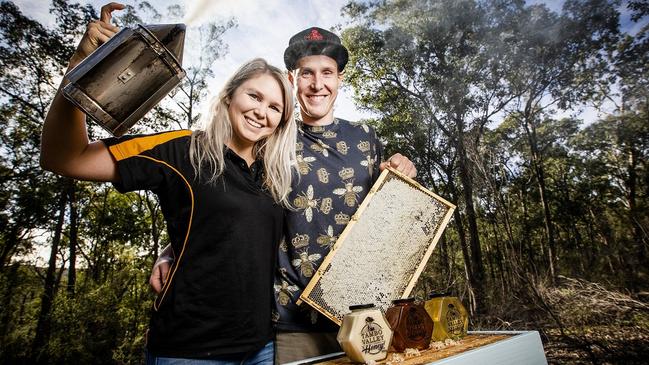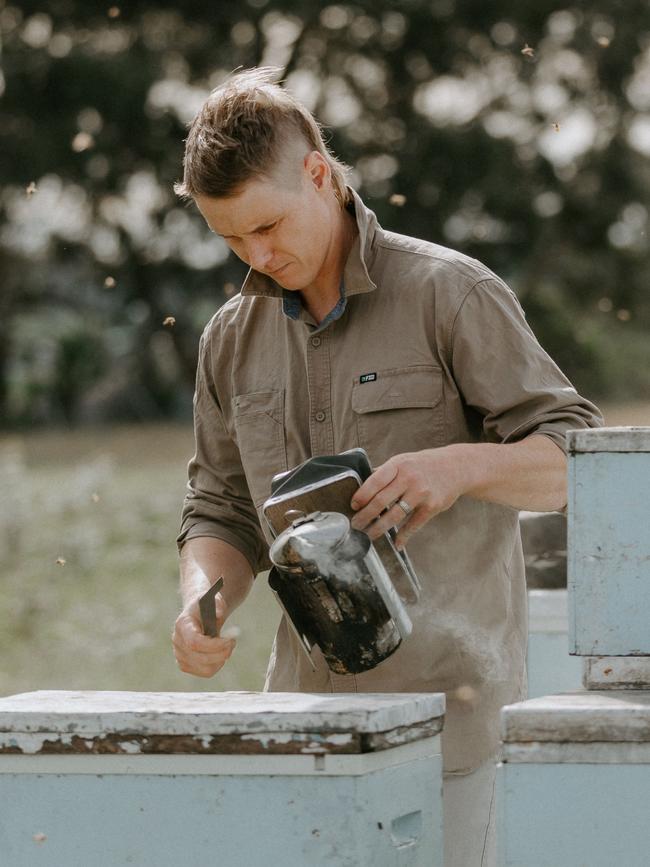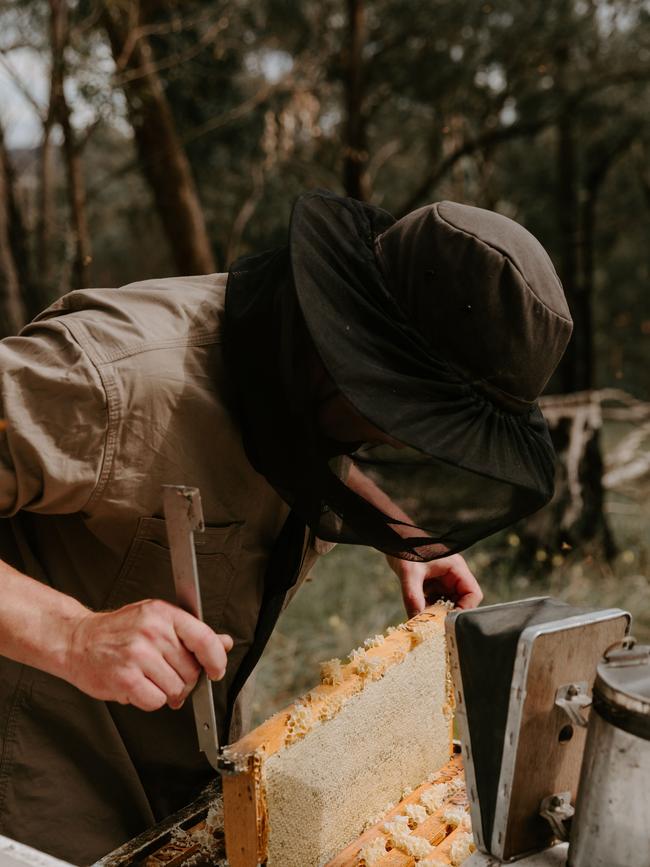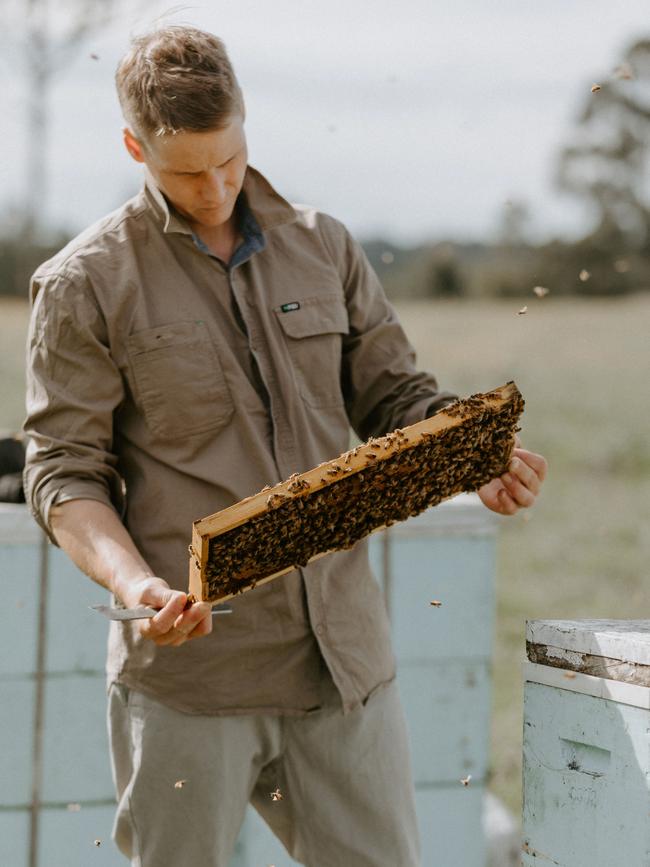Tambo Valley Honey: Bruthen beekeeper has big plans for rural tourism
Tambo Valley Honey’s new owners hope their innovative operation — including their new cafe, shop and packing facility — will attract plenty of outside interest.
As first generation commercial beekeepers, Ben and Stacey Murphy were rightly mindful of the potential to get stung in an industry heavily reliant on traditions and knowledge normally passed down from family to family.
With no heritance of expertise, they set about creating their own support network by looking outside the hive for mentors and drawing on experience and advice from the former owner of their Tambo Valley Honey business.

The learning curve has been steep and mistakes inevitable but the three-year journey has led them to a sweet new opportunity to blossom the business into an agritourism enterprise.
The Murphys, who have a strong connection to their small hometown of Bruthen in East Gippsland, have embarked on a new paddock-to-plate style venture that will not only add value to their beekeeping business but will help bring employment and economic benefits to the small rural community.
BUSY BEES ON SHOW
Their intention is to create a destination honey experience in the main street of Bruthen with a live hive, honey and bee-related products, as well as a touch of history and information to help educate consumers about the industry.
The design and fit-out is already underway with the venue slated for opening mid-year.
Ben said the project had been fast-tracked by a $400,000 regional economic stimulus and resilience grant awarded by the State Government in 2020.
“I never liked the idea of our honey going into the IBCs (intermediate bulk containers). You would extract it and it would come back with Beechworth or Capilano Honey on it or whoever we supplied at the time,” Ben said.
“Nothing against what they do, I just felt I wanted us to get the recognition for it. We’ve done all the hard work, it would be good to see it with our label on it.
“Only a small portion of our honey goes into our label jars. It would be great if we could turn that 10 per cent into 80 per cent.”
The new facility has the capacity to do that. A packing room at the rear of the complex will enable all pouring and packing to be done on site.

“We will also be incorporating a cafe restaurant with a honey-related menu and off-street dining to give customers the full honey experience,” Ben said, adding they were on the hunt for a hospitality partner to head up the destination cafe.
BUTCHER TO BEEKEEPER
A fifth-generation local, 32-year-old Ben grew up helping his parents in the Bruthen bakery before earning his butchering apprenticeship and then going on to work as a beekeeper for the Cane family.
“I’d never been stung by a bee until I left the butcher shop. It swelled up right past my elbow and I thought what have I done here, but eventually I got used to it,” Ben said.
“It’s such a unique job to be involved with and you are part of nature.”
Ben had always wanted to own his own business and after working with experienced beekeeper Ian Cane for six years, initiated a succession plan to buy the operation in 2018.
HIVE TO HONEY
The Murphys have 1000 hives that are moved to various bee sites leased in private and state forest areas of East Gippsland, including coastal and Alpine zones, and also into northwest Victoria’s Mallee country depending on what pollen is available.
The season starts in the Mallee with pollination contracts on almonds and canola over winter before conditions begin to warm up in East Gippsland during spring and summer.
“We are lucky here in East Gippsland we have such a variety of trees to pick from as well as ground floor, certain weeds and plants that grow throughout spring and summer in the bush that we can rely on to keep our bees alive and healthy,” Ben said.

“It is a year-round job and part of everyday life for us to check the bee sites. If we go away on a family camping trip, I will plan it that we go through an area I want to look at.
“There is no preference for the bees but if there is quality honeys from specific pollen that I know I will enjoy or others will enjoy, we will definitely opt for the site that is most appealing to the customer.”
QUEEN BEES
Through winter when the weather drops below 13C, the bees slow down, the queen stops laying as many eggs and the hive shrinks in numbers.
This gives Ben and Stacey a chance to conduct brood checks in their hives, look for any signs of disease and how much honey is being stored.
There are 50,000 to 60,000 European honey bees in each hive with the Murphys opting for a combined genetic balance of good temperament, gathering ability and robustness.
“You can breed all that into your queen,” Ben said. “Each year we breed 600 to 700 of our own queens.”
The process involves choosing a hive with all the traits that are sought, taking an egg that is 12-36 hours old, placing it in a cell cup with royal jelly produced by the worker bees, and the queen grows from there.
“From the day we set our cells, it’s 10 days before they are ready to hatch. Once hatched, the queen will walk about the hive for three to seven days, then she will leave the hive for a mating flight before returning,” Ben said.
HEALTHY HIVES
The health of the hives is dependent on the strength and health of the queen and weekly monitoring is important to ensure the bees are flying about, have pollen on their legs and are producing honey.
“They do require a lot of attention,” Ben said, adding hives were at greater risk of being robbed if bee numbers were down due to dwindling food sources.

“There is that importance of making sure all your hives are strong because as soon as you have a weak hive they become vulnerable,” he said.
“The other hives will go in and steal the honey and steal the queen. Then you are a hive down and you have lost the production of that hive and the biosecurity risk comes into it as well so it is crucial to stay on top of it.”
Depending on the season, harvest and extraction is conducted 45 days of the year with the Murphys taking only surplus honey to ensure the bees have enough to remain healthy.
THE TIME IS NOW
The health of the bees is their priority and having good support personnel around them has also been instrumental, particularly with the new agritourism venture, which hasn’t been without its complexities.
The fact it has come to fruition three years earlier than expected has added extra hurdles.
Ben and Stacey have a two young sons, Easton, 5, and Theo, 1, and the wet weather has also “wreaked havoc” on bee production this year.
“When it rains, the bees don’t fly so this season has actually been worse than the bushfire season when we lost a few hundred hives,” Ben said.
“Beekeeping can be very challenging but you get out what you put into it.
“There are so many little elements that need to be done and we will only have part finished for the shop opening but it will continue to grow with the consumer and the energy we bring to it.”




